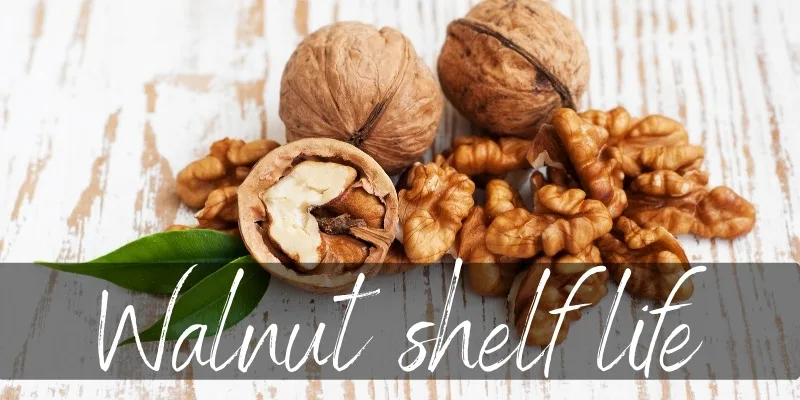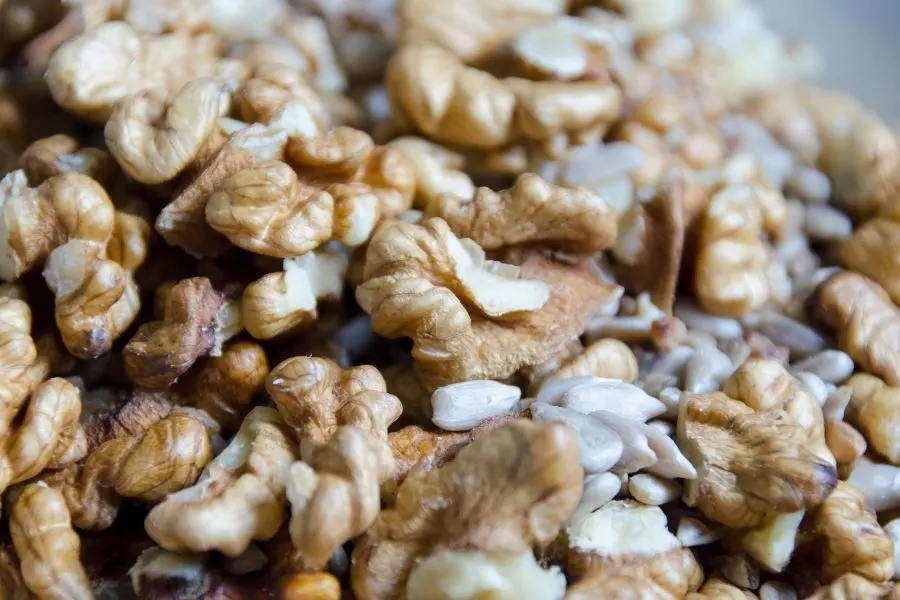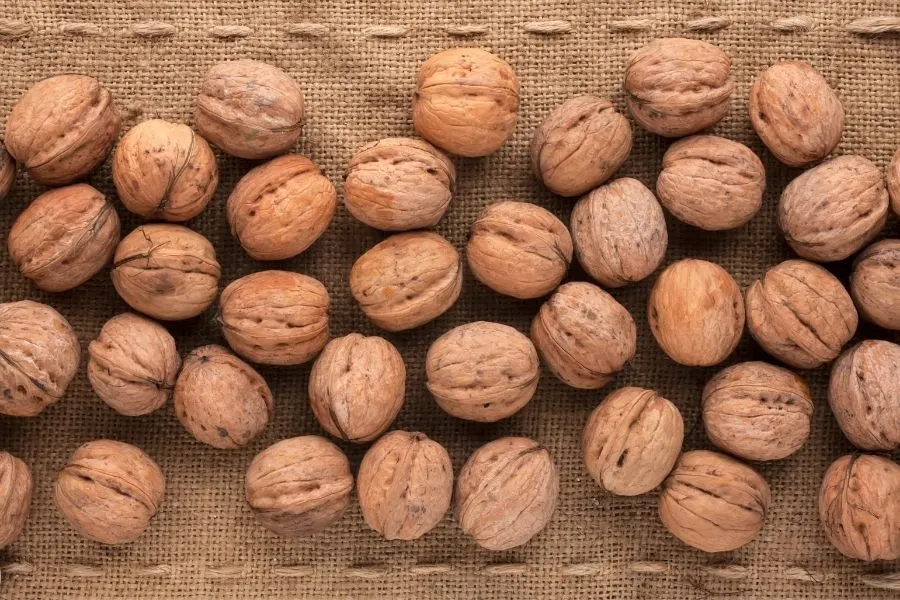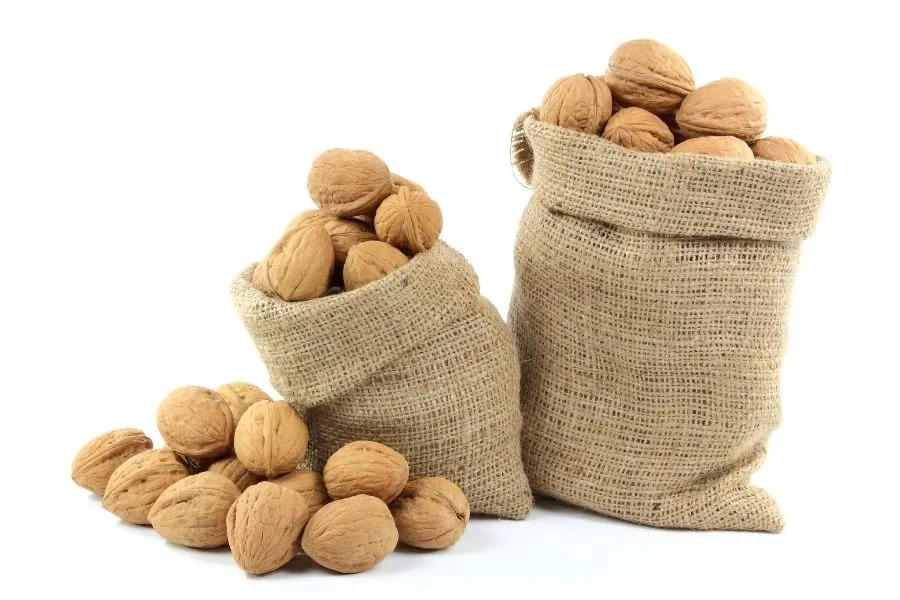If you like the idea of adding walnuts to your baked goods and other recipes, you surely prefer to buy a large batch of nuts and use them as needed. However, using some and storing the leftovers comes with a concern – how long do walnuts last?
If you are wondering how long can you store them safely, we’ve got you covered. Here’s a detailed guide that takes you through their shelf-life, the right way to store them, and the signs of spoilage.

How long do walnuts last?
Walnuts have a fair shelf life, lasting up to 3 months with the shells on at room temperature. When the shells are removed the nuts oxidize much quicker, only staying fresh for a couple of weeks.
It’s not like you should discard the whole batch when the 3 months have passed. But there are chances that at least a few of the nuts will seem dried out, rancid, or stale.
If you’ve got a batch with a best-by date mentioned on the label, try them out. Sometimes food items last a little longer than their best-by date.
In a nutshell, the longer you choose to store walnuts, the more you’ll find inedible when you open them. There comes a time when the walnuts aren’t good for adding to any recipe.
Read also: Do Walnuts Grow On Trees ?
Now let’s see about each type of walnut (shelled and unshelled), so you can find the shelf life for the ones you’re looking for.
Unshelled walnuts
If stored away from direct sunlight, unshelled walnuts can last for a surprisingly long duration. In fact, some of them can even stay just perfect for consumption for up to 4-5 months when stored properly.

This is in perfect condition, with no moisture, plenty of airflow, and a low temperature.
However, some shells are always likely to be penetrated by air and bugs. Still, you can easily differentiate them from the others with a few signs. They’re usually lighter in weight, have holes in them, and may even have some weird fuzz growing on them.
The longer you leave walnuts aside, the higher will be the chances of them turning bitter. Despite the workload, it’s best to take a hammer and crack all of them open and prepare for long term storage.
Shelled walnuts
Shelled walnuts call for a great deal of care when it comes to handling, as well as storage. They can last for quite long when they are still in an unopened packaging – as long as the expiry date mentions.
However, once they are opened, they will have a short shelf life due to the high fat content that’s vulnerable to spoilage. Even when you store them right, you can expect the walnuts to last up to 2 weeks when placed in the pantry.
And that’s why most people prefer to put shelled walnuts into an airtight box after opening the store-bought pack.
The shelf life of refrigerated walnuts can extend up to a couple of months. Still, one or two may always seem to turn unpleasant in that timeframe. A little caution is all it takes to inspect them before you eat them raw or add to any dishes.

How long do walnuts last in the fridge?
Properly stored unshelled and shelled walnuts last up to one year in the fridge. All you have to do is to put them in an airtight container or keep them in their bag if it wasn’t open.
Walnuts have a long shelf life as we already find out so in many cases it’s not worth it to put them in the fridge, you most probably have better things to do with that space since the walnuts will last a long time in a pantry without losing their quality.
Do walnuts go bad?
Walnuts contain oil that turns rancid after a while, thereby resulting in a bitter taste. Although, walnuts remain fresh for a long time, there comes a point when they are no longer palatable. That happens when the storage conditions are not fit for walnuts, especially when it comes to long-term storage.
This means warm storage temperatures, airflow, direct sunlight.
How to tell if walnuts are bad
Determining that some walnuts have turned bad is quite a tricky affair as they might not show any signs of spoiling straight away. There’s a bunch of ways walnuts go bad.
While the nuts are still in the shells, the first sign to make sure they aren’t good for eating is shriveled and shrunken shells. A dried up shell increases the chances of a bad nut inside.
You can save yourself the effort of opening these ones and just chuck them out instead, as 95% of nuts with shrunken shells will be inedible.
If the exterior looks just fine, you need to check it from the inside for signs of mold or net forming. If yes, make sure you discard the nuts straight away.
However, an important thing to know about walnuts is that sometimes, when the kernels and the nuts’ appearance seems just fine, they can be still inedible.
To check rancidity, perform a sniff test. Walnuts should have a fresh nutty aroma, but if they seem to smell more like rancid oil or cooking oil – the walnuts have gone bad. Some other chief signs include the nutmeat looking much darker than the usual, a paint-like smell, and a bitter flavor.
Read Also:Korma vs. Tikka Masala
How to store walnuts to make them last longer
Just like most other nuts, walnuts too are very high in fat content. And that’s the reason they can easily turn rancid and taste incredibly bitter. The key here is to store the nuts properly by keeping them away from certain food-damaging elements, including heat, air and moisture.
Walnuts that are still in their shells don’t usually call for refrigeration. You can simply keep them out of direct sunlight to prevent the shell from heating up. Place them in the pantry or the kitchen in a spot that’s away from sunlight. Just crack only enough walnuts that you are going to use in the following few days.

Speaking of shelled walnuts, they become vulnerable to moisture and oxygen as soon as they are shelled. Once you open the packaging, transfer the walnuts into an airtight container and put them in the refrigerator.
This extends the shelf life of walnuts from 2-3 weeks to even 2 months. Freezing them can extend their life even further if put in a vacuum food bag or a sealed container. Frozen walnuts retain their freshness for up to 12 months.
In short you should go for unshelled walnuts if you plan to stock them up. Unshelled ones keep a lot better than the shelled nuts, while going for a cold storage works best for both the varieties.
If you plan to keep them for a short term before consuming, keep them at room temperature. Make sure they’re in an airtight container. And the end results – a batch of rich walnuts loaded with nutritious goodness!

